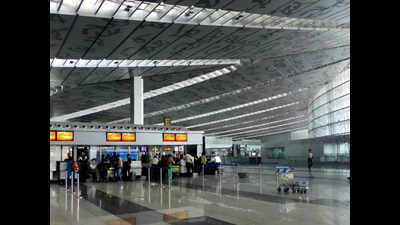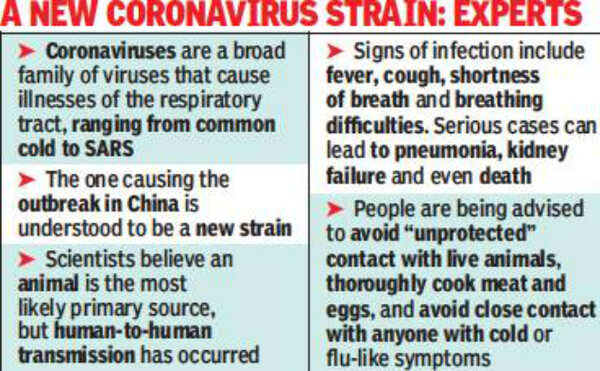- News
- City News
- kolkata News
- Kolkata airport on toes over mystery China virus, flyers being screened
Trending
This story is from January 21, 2020
Kolkata airport on toes over mystery China virus, flyers being screened
The mystery virus that has affected scores in China and resulted in three deaths may be a threat to Kolkata, which serves as a gateway to the southeastern part of the country, experts have warned.

Netaji Subhash Chandra Bose International Airport
KOLKATA: The mystery virus that has affected scores in China and resulted in three deaths may be a threat to Kolkata, which serves as a gateway to the southeastern part of the country, experts have warned. Checking the spread of the coronavirus — which has triggered pneumonia-like symptoms — can be difficult if the bug is carried to the city by an infected individual, virologists have said.
Reports of the spread of the virus in China and Japan and Thailand have prompted a travel advisory from the Union health ministry and resulted in screenings for passengers and crew of flights from China.

“We have introduced screening at the airport and travellers with symptoms of the viral attack will be quarantined immediately to prevent an outbreak,” airport director Kaushik Bhattacharjee said on Monday. All passengers flying to the city from China are being subjected to a “thermal screening” at the airport since last Friday.
“We have set up health counters at the pre-immigration area for inbound passengers from China. Passengers and crew are being asked to undergo thermal scanning to detect body temperature. In case they have fever, they will be isolated and sent to the Beleghata Infectious Diseases Hospital. However, so far, no one arriving here has tested positive,” Bhattacharjee said.
Virus can spread via cough, sneeze
Coronaviruses, being “droplet infections”, are highly contagious and can affect thousands in a matter of days. “Coronaviruses spread through cough and sneeze and can be easily transmitted in a closed environment. Even a single infected individual travelling on an aircraft can spread the virus to several,” internal medicine consultant Rahul Jain said. “And, once the infected individual reaches an airport or a station, many more may be infected even before s/he is identified and quarantined. So we need to be very careful and start screening travellers from China immediately,” he added.
“Droplets released through cough or sneeze can travel six feet, which puts everyone around an infected person at risk,” RN Tagore International Institute of Cardiac Sciences (RTIICS) consultant Arindam Biswas said. “Coronaviruses affect the lungs causing severe cough, cold and respiratory distress in extreme cases. The infection, unless checked in time, can turn into pneumonia that can be fatal. It seems from reports from China that this virus is akin to severe acute respiratory syndrome (SARS) that has claimed many lives in multiple outbreaks in recent years,” said Biswas.
The virus started spreading from Wuhan in south-east China but has now reached Beijing. Similar cases have been detected in Thailand and Japan as well, which might indicate that the virus has already started spreading across the region. The virus strain is yet to be identified but it is suspected to have spread from a seafood market in Wuhan that was shut down on January 1. But the infection had spread far by then.
A coronavirus outbreak could be difficult to manage in a city like Kolkata, with a big elderly population having immunity-affecting diseases like diabetes, kidney ailments and cardiac ailments. The viral attack itself may not be fatal but could trigger a secondary infection that may turn out to be deadly, Jain said. “Those with low immunity will be more vulnerable. Coronavirus leads to a reduced immunity in the elderly, because it invades the lungs, and they may then turn susceptible to bacterial infections that may lead to death,” he added.
Coronaviruses, despite their symptoms being similar to those of the common flu, can trigger a severe inflammatory response from the body. “The immune system reacts more strongly because of the severity of the virus and it ends up affecting vital organs like lungs and kidneys. Younger people are more likely to suffer because of a strong immune response that proves counter-productive; the elderly are likely to be left defenceless because of their low immunity,” explained Biswas.
Reports of the spread of the virus in China and Japan and Thailand have prompted a travel advisory from the Union health ministry and resulted in screenings for passengers and crew of flights from China.

“We have introduced screening at the airport and travellers with symptoms of the viral attack will be quarantined immediately to prevent an outbreak,” airport director Kaushik Bhattacharjee said on Monday. All passengers flying to the city from China are being subjected to a “thermal screening” at the airport since last Friday.
Four airlines fly to three destinations in China directly from Kolkata. IndiGo and China Eastern Airlines run daily direct flights from Guanzhou and Kunming, respectively; Cathay Pacific and Cathay Dragon operate flights from Hong Kong.
“We have set up health counters at the pre-immigration area for inbound passengers from China. Passengers and crew are being asked to undergo thermal scanning to detect body temperature. In case they have fever, they will be isolated and sent to the Beleghata Infectious Diseases Hospital. However, so far, no one arriving here has tested positive,” Bhattacharjee said.
Virus can spread via cough, sneeze
Coronaviruses, being “droplet infections”, are highly contagious and can affect thousands in a matter of days. “Coronaviruses spread through cough and sneeze and can be easily transmitted in a closed environment. Even a single infected individual travelling on an aircraft can spread the virus to several,” internal medicine consultant Rahul Jain said. “And, once the infected individual reaches an airport or a station, many more may be infected even before s/he is identified and quarantined. So we need to be very careful and start screening travellers from China immediately,” he added.
“Droplets released through cough or sneeze can travel six feet, which puts everyone around an infected person at risk,” RN Tagore International Institute of Cardiac Sciences (RTIICS) consultant Arindam Biswas said. “Coronaviruses affect the lungs causing severe cough, cold and respiratory distress in extreme cases. The infection, unless checked in time, can turn into pneumonia that can be fatal. It seems from reports from China that this virus is akin to severe acute respiratory syndrome (SARS) that has claimed many lives in multiple outbreaks in recent years,” said Biswas.
The virus started spreading from Wuhan in south-east China but has now reached Beijing. Similar cases have been detected in Thailand and Japan as well, which might indicate that the virus has already started spreading across the region. The virus strain is yet to be identified but it is suspected to have spread from a seafood market in Wuhan that was shut down on January 1. But the infection had spread far by then.
A coronavirus outbreak could be difficult to manage in a city like Kolkata, with a big elderly population having immunity-affecting diseases like diabetes, kidney ailments and cardiac ailments. The viral attack itself may not be fatal but could trigger a secondary infection that may turn out to be deadly, Jain said. “Those with low immunity will be more vulnerable. Coronavirus leads to a reduced immunity in the elderly, because it invades the lungs, and they may then turn susceptible to bacterial infections that may lead to death,” he added.
Coronaviruses, despite their symptoms being similar to those of the common flu, can trigger a severe inflammatory response from the body. “The immune system reacts more strongly because of the severity of the virus and it ends up affecting vital organs like lungs and kidneys. Younger people are more likely to suffer because of a strong immune response that proves counter-productive; the elderly are likely to be left defenceless because of their low immunity,” explained Biswas.
End of Article
FOLLOW US ON SOCIAL MEDIA










